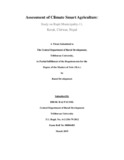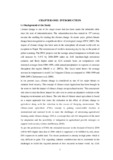Please use this identifier to cite or link to this item:
https://elibrary.tucl.edu.np/handle/123456789/2264| Title: | Assessment of Climate Smart Agriculture: Study on Rapti Municipality-11, Korak, Chitwan, Nepal |
| Authors: | Paudel, Bibek Raj |
| Keywords: | Assessment;Climate;Rural development |
| Issue Date: | 2019 |
| Publisher: | Central Department of Rural Development |
| Abstract: | The Global warming has struck the agriculture sector the most and has impacted in its production. The agricultural production and productivity have been depleting in the present days. For tackling the changing climatic condition and increase the production of agricultural goods, Climate Smart Agriculture has been introduced. This is a new practice where people try to adapt their pre-existing agriculture practice in the changing environment. The topic Assessment of Climate Smart Agriculture- A study on Rapti Municipality, Korak, Chitwan, Nepal has been prepared to analyze what change does a Climate Smart Agriculture practice brings in livelihood of the people as well as environment. For addressing the basic objective, three specific objectives are developed that include the assessment of socio-economic status of Climate Smart Agriculture practitioners in marginalized people of study area, evaluation of effectiveness of Climate Smart Agriculture practice (leasehold forestry) in the study area and analyze different practices under Climate Smart Agriculture practices in context of study area. For the conduction of this research, Katlekhola has been considered as the census as all of the population under 10 households living in Katlekhola leased forest user group has been considered as the respondent of this research. Both qualitative and quantitative data has been collected for conduction of this research with the help of both primary as well as secondary source. For the collection of data from primary source, Key Informant Interview, Focused Group Discussion, Interview as well as survey has been taken. In the study of leased forest user group of Katlekhola, the leasehold forestry has been playing a major role in changing the lifestyle of the people. The people were found to have uncovered a new dimension of economy as well as social development through the use of leasehold forestry. Not only the use of leasehold forestry, the people have been found to be using other CSA techniques that has helped them in making their life easier than before. After the introduction of leasehold forestry, the people had been profited to some extend but the profit that they received was not extra-ordinary. In terms of their socio-economic status, they have new dimension for economic earning as well as they have been able to uplift their social life to some extent. But the upliftment is not too overwhelming. Talking about the effectiveness in the leasehold forests, the forest area has grown more denser and thicker and greener. The marginalized people with the motive to sustainable management of the forest area has made an impression that if the right to use and care is given at the same time, the sense of parenthood is established in people this managing the property that they are given for use. Lastly, in terms of application of other Climate Smart Agriculture practice in the study area, plastic pond and multi water use system is more prevalent as these are the best way to adopt to the changing climate. With the change in climate, the scarcity of water has not only impacted in desertification, it has also impacted in day-to-day activities among the peoples. So, the two used methods of climate smart agriculture are suitable in-terms of the study area. Other than the two, vertical farming can be one of the most favorable method that can be followed. With the sloppy terrain and with limited water resource, vertical farming can be a boon for farming to the farmers as well as general population of the area. So, the idea of climate smart agriculture is a major breakthrough in adapting the changing climate. Despite the fact that the practices don’t have a fast and great impact in the livelihood of the people, it has the capacity to make a great deal of impact in the long run. Other than the adaptation, this can also help in mitigation of the climate change. As of leasehold forestry, when the forest area is grown more denser and greener, the capacity to soak up carbon dioxide present in atmosphere greatly increases. This increased capacity of the forest area helps in decreasing the rate of global warming as it helps in carbon sequestration and helps to complete the carbon cycle. The main problem of the present time, global warming, can be solved if the climate smart technique is used appropriately and more smartly (conduction of research to find out what kind of activity can be done and is appropriate in what type of places). |
| URI: | http://elibrary.tucl.edu.np/handle/123456789/2264 |
| Appears in Collections: | Rural Development |
Files in This Item:
| File | Description | Size | Format | |
|---|---|---|---|---|
| Cover Page-4.pdf | 549.73 kB | Adobe PDF |  View/Open | |
| CHAPTER -1.pdf | 1.84 MB | Adobe PDF |  View/Open |
Items in DSpace are protected by copyright, with all rights reserved, unless otherwise indicated.
